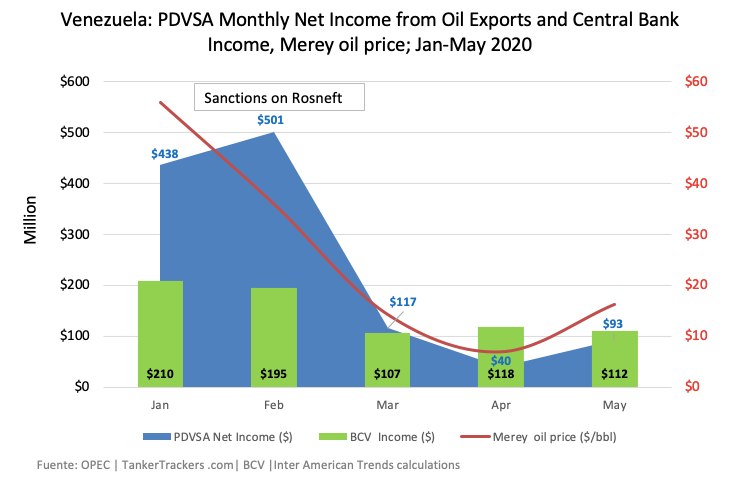





|
Tweet
|
|
|
Donald Trump's maximum pressure policy on Venezuela has its de facto president Nicolas Maduro against the wall. If it is maintained, it will lead to a negotiated solution to the deep crisis that the Bolivarian country is going through. To explore this matter, the interim government of Venezuela, headed by Juan Guaidó, has been holding a series of conferences with former presidents (of Spain and Latin America) to review the lessons learned regarding peaceful political transitions. So far, the conferences have presented Spain (1975–1982) and Uruguay (1980–1985) cases, as well as the peace process in Central America (1983–1987). Former presidents Felipe González of Spain, Julio María Sanguinetti of Uruguay, and Oscar Arias of Costa Rica agree that each transition has its own characteristics and depends on each country historical reality. All three ex-presidents agreed that during a peaceful transition from a previous dictatorial regime, the aim is for the old authoritarian order to be replaced by a new, democratic government, the result of free elections. It is clear from the conversations with the three politicians that a peaceful transition requires patience, perseverance, and consensus for an orderly negotiated solution that allows the building of trust in “those who leave” because “everyone excluded becomes an enemy of the new order”. Arias recalled that in Nicaragua’s case, Daniel Ortega accepted the Peace Plan because he had no real choice. Either he signed the plan and committed to elections overseen by the Carter Center, the Organization of American States (OAS), and NGOs around the world, or he rejected it and US aid to the Contra would continue. According to Arias, “And with each passing day, Nicaragua became poorer. It spent 25% of GDP in maintaining an internal war”. Sanguinetti observed that sanctions have been important in leading autocratic regimes to negotiate a way out. He recalled that the Carter administration in the US (1977–1981) applied economic sanctions against the Uruguayan civil-military government for human rights violations. These sanctions caused economic stagnation, an inflationary process, and the financial crisis in Uruguay, all of which impacted on the political support that the dictatorship enjoyed. Currently, the Trump administration’s maximum pressure policy towards Venezuela is increasingly reducing licit currency flows that allow Nicolás Maduro to keep power in Venezuela. For example, after 16 months of US sanctions on State oil company PDVSA and three months on Russia’s Rosneft—which Maduro used to export Venezuelan crude and import gasoline—net income [1] from oil exports has fallen 80% from 500 million dollars in February to 100 million dollars in May. One of the causes of the net income from oil exports falling so dramatically is that the shipowners have stopped going to Venezuela to avoid the sanctions imposed by the US Treasury on PDVSA, and this has reduced the sales volume of Venezuelan crude. Other reasons that have impacted the decrease in foreign exchange are the drop in oil prices due to COVID-19 (confinement) and the discount on the oil price for taking the risk to circumvent US sanctions. Last month, the daily net revenue from oil exports was 3.1 million dollars. Additionally, the International Reserves of the Central Bank of Venezuela reported a monthly income of 112 million dollars in May. This amount is only enough to satisfy 10% of the imports of goods required monthly in 2019. If the US administration maintains and deepens this maximum pressure policy in the coming months, Maduro will face a critical situation to sustain the groups that support him in power, which could lead him to seek a negotiated solution. Likewise, the negotiation time could be shortened if the extradition to the US of Maduro's alleged dealmaker Alex Saab, a Colombian-born businessman, currently detained in Cape Verde, occurs. Maduro will be exposed to the governments that support him as the head of Venezuela's criminal enterprise, which would generate internal tensions to replace him by another Chavist. Arias affirmed that the work to build a peaceful transition towards democracy is very difficult because dictators know how to hold on to power. Arias also said that “it is what the Cuban government is saying to Maduro every day”. He added that to achieve the negotiated exit in Venezuela, “vast international support is needed. The OAS must be involved and have the support not only of the 60 governments that recognize Guaidó as interim president but of 120 or 180 governments. International and international organizations’ support is vital to give credibility to a transitional government”. Arias finally stated that in the case of Venezuela, “Cuba is going to oppose everything that is a free election. It is a reality that you [political parties] have to work with”. Maduro is under increasing pressure to negotiate a peaceful exit due to the maximum pressure policy of the US administration. This policy must be maintained on all fronts to achieve the negotiated exit that the former presidents recommend. [1] Net income here refers to the balance generated by oil exports, discounting the barrels that cancel the debt with China, Spain, Russia, and the barrels that go to Cuba. |

